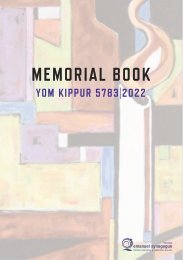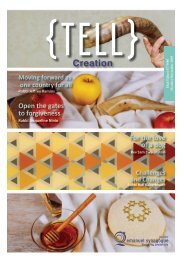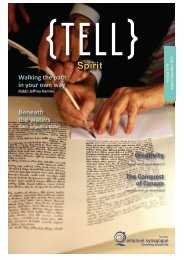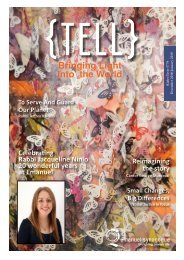Create successful ePaper yourself
Turn your PDF publications into a flip-book with our unique Google optimized e-Paper software.
tipping point for biodiversity<br />
and the loss of insects can have a<br />
cascading impact on food security.<br />
Insects are critical for pollination,<br />
recycle materials in the soil and<br />
provide the main source of food<br />
for birds, bats, fish and many other<br />
vertebrate species. One in three bites<br />
of food rely on insect pollination.<br />
As reported this month in The<br />
Sydney Morning Herald, BBC and<br />
other leading news media, a just<br />
published scientific review provides<br />
sobering research and statistics on<br />
the loss of insects. There has been<br />
a reported decline of more than<br />
75pc of total insect biomass in 27<br />
years. A UK study found that many<br />
species of butterflies and moths<br />
are declining at alarming rates.<br />
Entomologists across Australia also<br />
report lower than average numbers<br />
of wild insects. Bee collapse is<br />
a huge international concern.<br />
While bee colony collapse has<br />
not happened in Australia, many<br />
experts say our bees face threats.<br />
The academic study found a linear<br />
decline of 2.5% of current (<strong>2019</strong>)<br />
biomass, which is estimated to<br />
lead to the total disappearance<br />
of insects within 40 years.<br />
The main causes of insect species<br />
decline are habitat loss, pesticides and<br />
fertilisers, biological factors including<br />
introduced species, and climate<br />
change. While it is also important to<br />
create more varied habitat in rural<br />
areas, our cities can help the loss of<br />
biodiversity and it is also predicted<br />
that we will increasingly use our<br />
urban areas for food and farming.<br />
The B & Bs are located at community<br />
centres, places of worship from a<br />
range of different faiths throughout<br />
Sydney and at community housing<br />
supported by Community Greening.<br />
With eight centres already funded by<br />
the B and B Highway, each B & B<br />
features a special variety of pollinating<br />
plants selected by horticulturists<br />
as well as an insect hotel or native<br />
stingless beehive. Sydney’s eastern<br />
suburbs will form an important<br />
foundational hub and there are other<br />
‘pollen booths’ in Lane Cove and Mt<br />
Druitt with more being planned.<br />
The initiative is inspired by<br />
other pollinator highways in<br />
Belfast, Oslo and Vancouver.<br />
Judy Friedlander says that creating<br />
pollinating gardens with native plants<br />
that flower the whole year round is a<br />
‘win win for pollinators and people’.<br />
‘I was fortunate enough to be<br />
surrounded by bees, butterflies and<br />
birds as a child – as many of us<br />
were – and we should be working<br />
to ensure that our children have<br />
these same nurturing foundational<br />
experiences of nature,’ she says.<br />
‘Importantly, there is a very serious<br />
side to this and this recent scientific<br />
report provides a wake-up call for us.<br />
‘It is not alarmist to say we are at<br />
a crucial time and if we don’t do<br />
something to help our pollinators we<br />
are in serious trouble. Fortunately, we<br />
can do something to help insects –<br />
the little things that run the world.’<br />
If you would like to support<br />
this initiative or find out<br />
more information, contact<br />
info@foodfaith.com.au<br />
Want to plant some pollinating plants<br />
in your garden? Some suggestions:<br />
- Native flowers such as Cutleaf<br />
daisy Brachysomes<br />
- Lavender is high in nectar<br />
and flowers all-year round<br />
- Native bees also love herbs such<br />
as basil, thyme, sage, rosemary,<br />
lemon balm and mint<br />
- Aussie favourites: Flowering<br />
gum, tea tree, acacia,<br />
bottlebrush, grevillea<br />
ENVIRONMENT<br />
27















